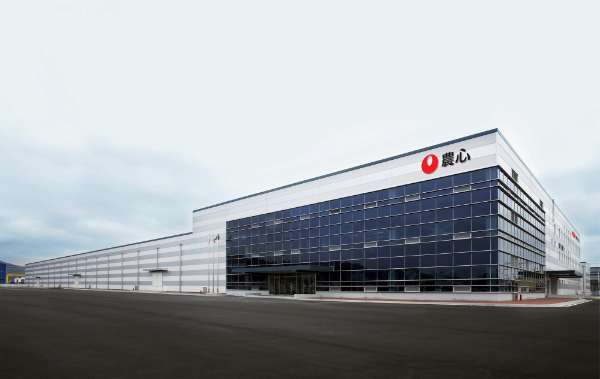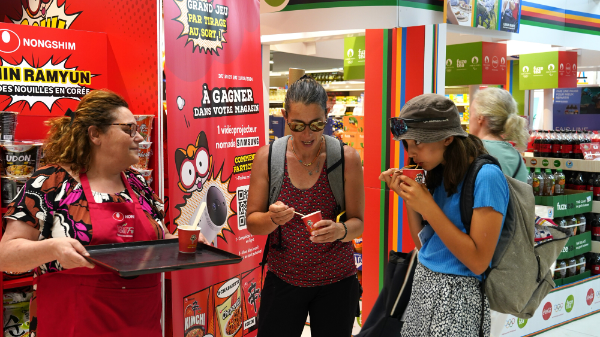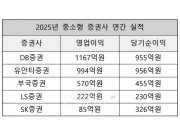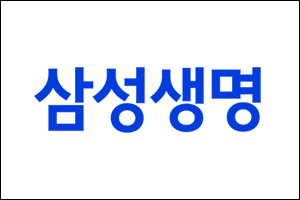
Nongshim Busan Noksan Plant. /Photo=Nongshim
According to the industry on September 5, Nongshim reported sales of KRW 1.7332 trillion in the first half of this year, up 2.1% from the previous year (KRW 1.6979 trillion). However, operating profit fell 10.6% to KRW 105.1 billion from KRW 117.5 billion in the previous year. Net profit of KRW 96 billion was also down 3.2% from the previous year (KRW 99.2 billion). Nongshim explained that this was due to lower prices of popular products such as 'Shrimp Cracker' and 'Shin Ramyun'. Increases in production costs and management expenses also weighed on the company.
Overseas, performance was remarkable. This is thanks to a significant increase in exports of its main business, instant noodles and snacks. Nongshim's overseas subsidiaries posted sales of KRW 483.1 billion in the first half of this year, down 4.6% from the previous year (KRW 506.2 billion). However, domestic sales of KRW 1.25 trillion, up 4.9% from the previous year (KRW 1.19 trillion), more than offset the decline.
Nongshim's domestic performance was driven by exports. In the first half of the year, Nongshim's exports totaled KRW 176.7 billion, up 28.6% from KRW 137.4 billion a year earlier. When combined with overseas sales, the total amounted to about KRW 659.8 billion. This is a 2.5% increase from last year's KRW 643.6 billion. As a result, overseas sales accounted for 38.1% of Nongshim's total sales, up slightly from 37.9% in 2023. This is proof that Nongshim's K-ramyun, led by Shin Ramyun, is still on the rise.
Nongshim currently has seven local subsidiaries in Korea, the United States, China, Japan, Vietnam, Canada, and Australia. Production plants are located in seven locations in Korea (Anyang, Pyeongtaek, Anseong, Asan, Chungnam, Busan, Gumi, Gyeongbuk) and five overseas (USA, China, etc.). In May 2022, Nongshim opened its second plant on its California production line in May 2022. The K-Ramyun craze in the U.S. market has increased production. This will allow Nongshim to produce 850 million instant noodles annually in the US.
Last year, Nongshim generated about KRW 1.21 trillion in sales from Shin Ramyun alone, of which about 710 billion won came from overseas. That's why Nongshim is considering expanding additional factories in the United States. The plan is to increase production facilities to meet the rush of orders and drive outward growth for the entire group, especially as rival Samyang Foods has been taking over the top quarterly spot with its buldak stir-fried noodles. In the first half of this year, Samyang Food also posted record sales of KRW 810.2 billion, up 52.6% from the previous year. Of the total, sales of buldak stir-fried noodles accounted for about KRW 560 billion, or 69% of the total. In March, Samyang Food also broke ground on its second factory in Milyang, Gyeongnam, a factory dedicated to exports.
Nongshim Chairman Shin Dong-won is also active. He mentioned the new plant expansion at the annual general meeting of shareholders in March. At the time, Shin said, “We are currently thinking about establishing a sales subsidiary in Europe because exports are doing well,” adding, “We are also considering building export-only plants at existing sites such as Pyeongtaek (Poseung Plant) and Busan (Noksan Plant).” As he said, Nongshim started to materialize the 'K-Ramyun' blueprint' in the second half of the year.

Nongshim pop-up store at Carrefour in France. /Photo=Nongshim
First, in June this year, Nongshim introduced Shin Ramyun and other products to French retail giants LeClaire and Carrefour. Along with Shin Ramyun, which is popular in the local market, Nongshim also displayed its competitive products such as Neoguri, Shrimp Cracker, and Onion Ring. During the Paris Olympics, the company held a Carrefour pop-up event and held a Ramyun tasting event for locals. In addition to France, Nongshim is also working hard to target southwestern Europe, including Spain and Italy. In the Nordic countries such as Sweden and Denmark, the company plans to utilize local distribution networks to introduce its products. Nongshim is also planning to establish a European sales subsidiary early next year.
The company also plans to expand its production line for exports with a total area of 51,000㎡ (15,500 pyeong) on the 17,000㎡ (5,100 pyeong) site of its Noksan factory in Busan, aiming for completion in the first half of 2026. The investment for the plant is KRW 191.8 billion. The Busan Noksan plant will have a total of three high-speed, state-of-the-art lines. This will bring the total number of production lines at the Busan Noksan plant to eight, and the annual production of instant noodles will increase from 500 million units to 1 billion units. Nongshim's global production capacity will also increase to 2.7 billion units, including 1 billion units from the U.S. and 700 million units from China. The Busan Noksan plant is also close to Busan Port, Korea's export outpost, which will significantly reduce logistics costs. The Ramyun produced here will be shipped to Europe, South America, Africa, Oceania, and other new frontiers for K-Ramyun.
"Busan Port is a representative port in Northeast Asia with export routes from about 150 countries around the world," a Nongshim official said. "Considering the accessibility of Busan Port, which has global export efficiency, the site of the new plant has been decided as Noksan National Industrial Complex."
Son Wontae (tellme@fntimes.com)

























![박상진 네이버페이 대표, 연간 결제액 86조 달성…스테이블코인 도입 '페달' [금융사 2025 실적]](https://cfnimage.commutil.kr/phpwas/restmb_setimgmake.php?pp=006&w=69&h=45&m=5&simg=2025110801135107432dd55077bc212411124362.jpg&nmt=18)
![[DQN] 신한카드 1위·삼성카드 성장율 두각…하나카드 하위권 여전 [카드사 2025 신용판매 실적]](https://cfnimage.commutil.kr/phpwas/restmb_setimgmake.php?pp=006&w=69&h=45&m=5&simg=20260130155603014139efc5ce4ae211217229113.jpg&nmt=18)
![정진완號 우리은행, CET1비율 위한 '극단적' 선택···소호대출 12% '감소' [금융사 2025 실적]](https://cfnimage.commutil.kr/phpwas/restmb_setimgmake.php?pp=006&w=69&h=45&m=5&simg=2026020918490601265b4a7c6999c121131189150.jpg&nmt=18)


![[DCM] 대신F&I, NPL 회수율 86% 목표…’낙관 VS 역량’ 시험대](https://cfnimage.commutil.kr/phpwas/restmb_setimgmake.php?pp=006&w=69&h=45&m=5&simg=2026021006342504892a837df6494123820583.jpg&nmt=18)
![DB·유안타 등 두 자릿수 순익 성장, 중소형 증권사 실적 개선…대형사와 양극화는 과제 [금융사 2025 실적]](https://cfnimage.commutil.kr/phpwas/restmb_setimgmake.php?pp=006&w=69&h=45&m=5&simg=20260210170433032140f4390e77d222110701.jpg&nmt=18)

![황병우號 iM금융, 자본효율화·자산리프라이싱 '성공'...과제는 '비이자이익' [금융사 2025 실적]](https://cfnimage.commutil.kr/phpwas/restmb_setimgmake.php?pp=006&w=69&h=45&m=5&simg=2025111415030600919300bf52dd2121131180157.jpg&nmt=18)













![[그래픽 뉴스] 워킹맘이 바꾼 금융생활](https://cfnimage.commutil.kr/phpwas/restmb_setimgmake.php?pp=006&w=298&h=298&m=1&simg=202602021638156443de68fcbb3512411124362_0.jpg&nmt=18)
![[그래픽 뉴스] 매파·비둘기부터 올빼미·오리까지, 통화정책 성향 읽는 법](https://cfnimage.commutil.kr/phpwas/restmb_setimgmake.php?pp=006&w=298&h=298&m=1&simg=202601281456119025de68fcbb3512411124362_0.jpg&nmt=18)
![[그래픽 뉴스] 하이퍼 인플레이션, 왜 월급이 종잇조각이 될까?](https://cfnimage.commutil.kr/phpwas/restmb_setimgmake.php?pp=006&w=298&h=298&m=1&simg=202601141153149784de68fcbb3512411124362_0.jpg&nmt=18)
![[그래픽 뉴스] 주식·채권·코인까지 다 오른다, 에브리싱 랠리란 무엇일까?](https://cfnimage.commutil.kr/phpwas/restmb_setimgmake.php?pp=006&w=298&h=298&m=1&simg=202601071630263763de68fcbb3512411124362_0.jpg&nmt=18)
![[그래픽 뉴스] “이거 모르고 지나치면 손해입니다… 2025 연말정산 핵심 정리”](https://cfnimage.commutil.kr/phpwas/restmb_setimgmake.php?pp=006&w=298&h=298&m=1&simg=202601061649137526de68fcbb3512411124362_0.jpg&nmt=18)
![[신간] 고수의 M&A 바이블](https://cfnimage.commutil.kr/phpwas/restmb_setimgmake.php?pp=006&w=81&h=123&m=5&simg=2025091008414900330f8caa4a5ce12411124362.jpg&nmt=18)
![[신간] 리빌딩 코리아 - 피크 코리아 극복을 위한 생산성 주도 성장 전략](https://cfnimage.commutil.kr/phpwas/restmb_setimgmake.php?pp=006&w=81&h=123&m=5&simg=2025032814555807705f8caa4a5ce12411124362.jpg&nmt=18)
![[서평] 추세 매매의 대가들...추세추종 투자전략의 대가 14인 인터뷰](https://cfnimage.commutil.kr/phpwas/restmb_setimgmake.php?pp=006&w=81&h=123&m=5&simg=2023102410444004986c1c16452b0175114235199.jpg&nmt=18)


![[신간] 이게 화낼 일인가?](https://cfnimage.commutil.kr/phpwas/restmb_setimgmake.php?pp=006&w=81&h=123&m=5&simg=2026010610254801367f8caa4a5ce12411124362.jpg&nmt=18)

![[AD] 현대차, 글로벌 안전평가 최고등급 달성 기념 EV 특별 프로모션](https://cfnimage.commutil.kr/phpwas/restmb_setimgmake.php?pp=006&w=89&h=45&m=1&simg=20260106160647050337492587736121125197123.jpg&nmt=18)
![[AD] 현대차 ‘모베드’, CES 2026 로보틱스 부문 최고혁신상 수상](https://cfnimage.commutil.kr/phpwas/restmb_setimgmake.php?pp=006&w=89&h=45&m=1&simg=20260105103413003717492587736121125197123.jpg&nmt=18)
![[AD] 기아 ‘PV5’, 최대 적재중량 1회 충전 693km 주행 기네스 신기록](https://cfnimage.commutil.kr/phpwas/restmb_setimgmake.php?pp=006&w=89&h=45&m=1&simg=20251105115215067287492587736121125197123.jpg&nmt=18)
![[카드뉴스] KT&G, 제조 부문 명장 선발, 기술 리더 중심 본원적 경쟁력 강화](https://cfnimage.commutil.kr/phpwas/restmb_setimgmake.php?pp=006&w=89&h=45&m=1&simg=202509241142445913de68fcbb3512411124362_0.png&nmt=18)
![[AD]‘황금연휴에 즐기세요’ 기아, ‘미리 추석 페스타’ 이벤트 실시](https://cfnimage.commutil.kr/phpwas/restmb_setimgmake.php?pp=006&w=89&h=45&m=1&simg=20250903093618029117492587736121166140186.jpg&nmt=18)



